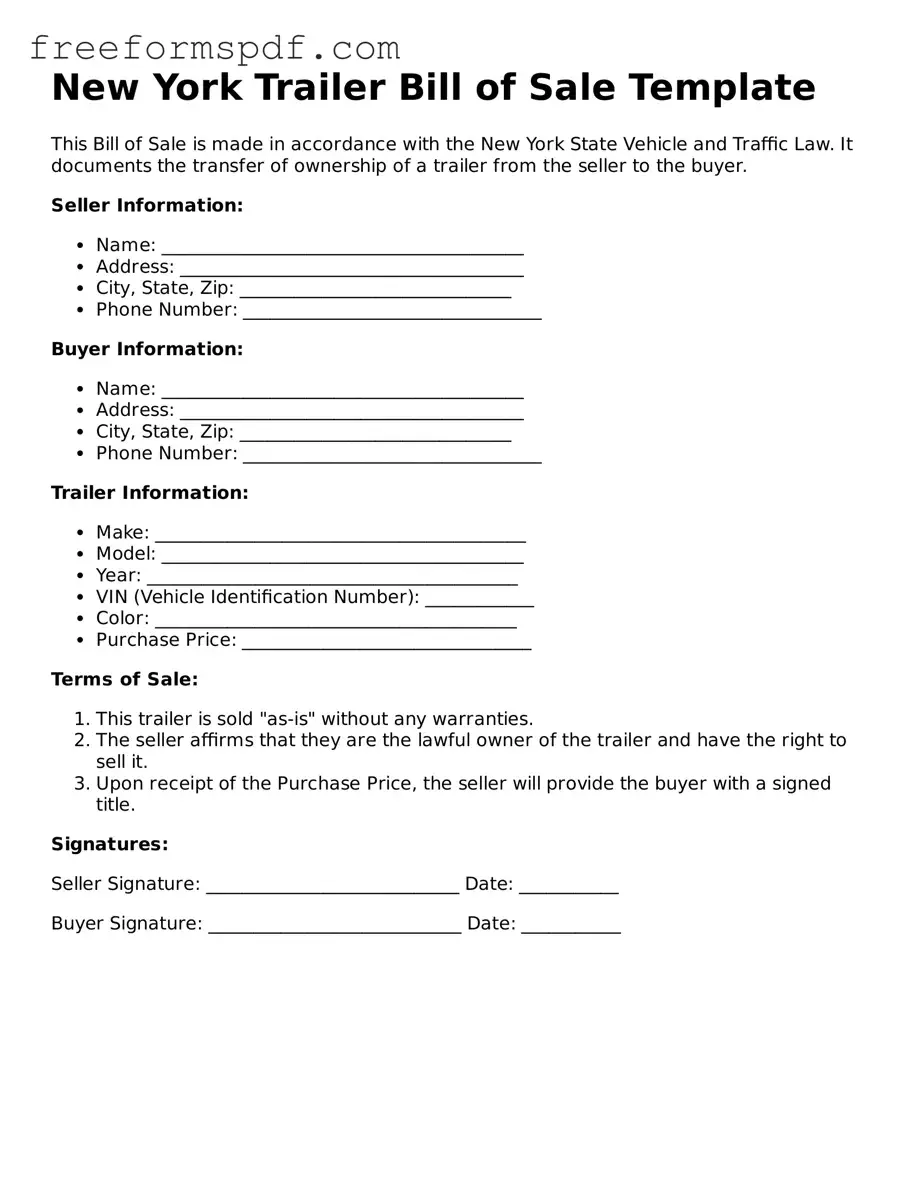Attorney-Verified Trailer Bill of Sale Document for New York State
Common mistakes
-
Incomplete Information: Failing to provide all required details can lead to delays or issues with registration. Ensure that all fields are filled out completely.
-
Incorrect Vehicle Identification Number (VIN): Double-check the VIN for accuracy. An incorrect VIN can cause significant problems when trying to register the trailer.
-
Omitting Signatures: Both the seller and buyer must sign the document. Missing signatures can invalidate the bill of sale.
-
Wrong Date: Always use the correct date of the transaction. An incorrect date can create confusion regarding ownership transfer.
-
Not Including Payment Details: Clearly state the purchase price and payment method. This helps avoid disputes later on.
-
Failure to Provide a Bill of Sale Copy: Both parties should keep a copy of the signed bill of sale for their records. This is crucial for future reference.
-
Ignoring Local Laws: Be aware of any local regulations regarding trailer sales. Some areas may have specific requirements that differ from state laws.
-
Not Notarizing the Document: While not always required, having the bill of sale notarized can provide additional legal protection and credibility.
Learn More on This Form
-
What is a Trailer Bill of Sale?
A Trailer Bill of Sale is a legal document that serves as proof of the transfer of ownership of a trailer from one party to another. This form outlines essential details, including the buyer's and seller's information, a description of the trailer, and the sale price. It is crucial for both parties to have this document to ensure a smooth transaction and to protect their respective rights.
-
Why do I need a Trailer Bill of Sale?
Having a Trailer Bill of Sale is important for several reasons. First, it provides a clear record of the transaction, which can be invaluable for future reference. Second, this document can help prevent disputes between the buyer and seller regarding the terms of the sale. Lastly, it is often required when registering the trailer with the Department of Motor Vehicles (DMV) or obtaining a title, ensuring that the new owner can legally operate the trailer.
-
What information should be included in the Trailer Bill of Sale?
A comprehensive Trailer Bill of Sale should include:
- The full names and addresses of both the buyer and seller
- A detailed description of the trailer, including make, model, year, and Vehicle Identification Number (VIN)
- The sale price
- The date of the transaction
- Any warranties or guarantees, if applicable
Including all this information helps ensure that the document is complete and legally binding.
-
Is a Trailer Bill of Sale required in New York?
While a Trailer Bill of Sale is not legally mandated in New York, it is highly recommended. Without this document, proving ownership can become complicated, especially if the buyer wishes to register the trailer or sell it in the future. Having a Bill of Sale can simplify these processes and provide peace of mind for both parties involved.
-
Can I create my own Trailer Bill of Sale?
Yes, you can create your own Trailer Bill of Sale. However, it is essential to ensure that it includes all necessary information and complies with state laws. Many templates are available online, which can serve as a helpful starting point. If you choose to draft your own, consider consulting with a legal expert to verify that it meets all requirements and protects your interests.
Misconceptions
The New York Trailer Bill of Sale form is often misunderstood. Here are seven common misconceptions about this important document:
-
It is only necessary for new trailers.
Many believe the form is only required when purchasing a new trailer. In reality, it is essential for both new and used trailers to establish ownership and transfer rights.
-
It must be notarized.
Some people think that notarization is mandatory for the bill of sale to be valid. While notarization can add an extra layer of authenticity, it is not a legal requirement in New York.
-
Only the seller needs to sign it.
This misconception suggests that only the seller's signature is necessary. In fact, both the buyer and the seller should sign the document to ensure a proper transfer of ownership.
-
It is not needed if the trailer is registered.
Some assume that if the trailer is already registered, a bill of sale is unnecessary. However, the bill of sale serves as proof of the transaction and is important for the buyer's records.
-
It can be a verbal agreement.
While verbal agreements may be common in some transactions, a bill of sale is crucial for documenting the sale in writing. This protects both parties in case of disputes.
-
It is the same as a title transfer.
Many confuse the bill of sale with the title transfer process. The bill of sale is a separate document that provides proof of the transaction, while the title transfer is necessary for registering the trailer in the new owner's name.
-
It is only needed for large trailers.
Some people think that smaller trailers do not require a bill of sale. Regardless of size, any trailer sale should be documented with this form to ensure legal clarity.
Some Other Trailer Bill of Sale State Templates
How to Register a Trailer - Records the trailer identification number (VIN).
The California Employment Verification form is a document used to confirm an employee’s job status and details with their current or past employer. This form is an essential tool for various purposes, including loan applications, background checks, and other employment-related processes. For more information on how to obtain this documentation, you can visit PDF Documents Hub.
Trailer Title - This helps sellers avoid liability after the trailer is sold.
Oregon Trailer Laws - Includes a space for Vehicle Identification Number (VIN) for clarity.
